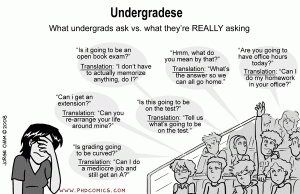Academic entitlement (AE) is “the tendency to possess an expectation of academic success without taking personal responsibility for achieving that success” (Chowning & Campbell, 2009, p.982). For an excellent translation of the jargon, check out Jorge Cham’s fantastic comic “Undergradese”
Despite (or perhaps because of) the proliferation of self-report AE inventories (Kopp, Zinn, Finney, & Jurich, 2011) research on this topic is progressing slowly. Typical studies are correlational in nature and tend to focus on self-report data only. AE rates are compared by generational status (Boswell, 2012) , gender and class standing (Ciani, Summers, & Easter, 2008) and related to individual differences, including externalizing attribution patterns and narcissism (Greenberger, Lessard, Chen, & Farruggia, 2008). Some initial evidence links AE to noncompliance (Kopp & Finney, 2013) and the endorsement of plagiarism and cheating (Chowning and Campbell, 2009). The future of AE research lies in establishing a relationship with student academic outcomes and actual student behaviors.
- In collaboration with Dr. Christopher Garris, now of Metropolitan State University, I’ve conducted a study comparing levels of academic entitlement in U.S. and Saudi Arabian students. The assumption is that entitlement, including its specific manifestation in the higher ed classroom, is an American, or Western phenomenon. We collected the first data on academic entitlement outside of North America and found higher levels among Saudis, with Saudi women reporting more academic entitlement than Saudi men. Our work was published in The Journal of Experimental Education.
- Faculty members report an increase in student entitlement, but how do faculty come by these impressions? Are they using email to reach their conclusions? This semester I am working with two students to analyze the email communication of over 200 students. We are looking for associations between academic entitlement and email communication. We want to see if entitled students make more (and different) demands on faculty in their emails and are less likely to use formal greetings and salutations, or to proofread their emails. Stay tuned for more from this active research project!
- As part of the PRISM program, Longwood student Gina D’Orazio collected data on academic entitlement and academic performance. Read more about her work on the PRISM page of this website.
